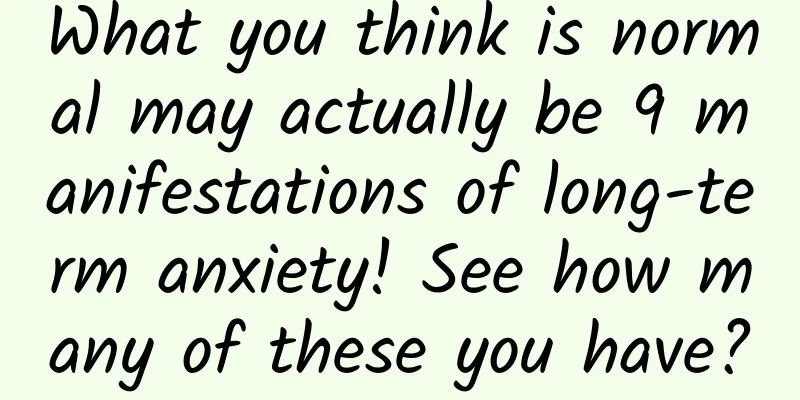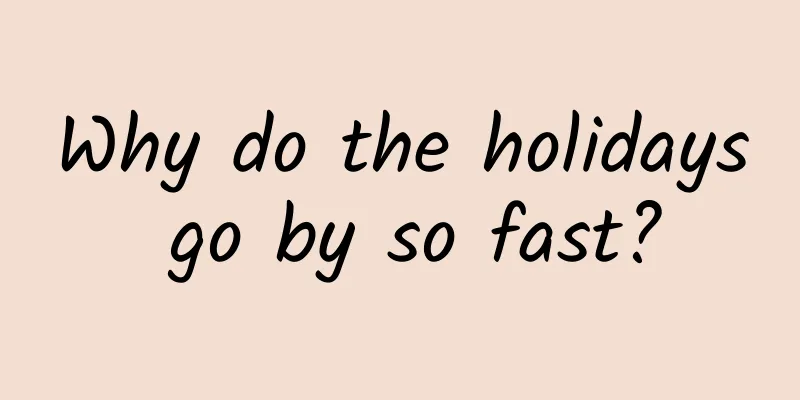What you think is normal may actually be 9 manifestations of long-term anxiety! See how many of these you have?

|
Anxiety is an emotion that everyone experiences, but few people know that anxiety disorder is a mental illness that can seriously affect life (in layman's terms, we call it anxiety disorder). Even those who are in the midst of it may not realize that they are suffering from anxiety. Many people who have suffered from anxiety disorders are surprised to find, when looking back on that experience, that anxiety is not only psychological, its physiological manifestations are usually obvious from beginning to end. It’s just that these symptoms are not like the small red or black spots on the skin that can quickly attract our attention. They are even considered normal because they are too integrated into daily habits. The presence of the following symptoms does not mean that you have anxiety disorder, but if they appear repeatedly and no other causes can be found after various tests, then you may need to pay attention: This may be your body's way of telling you that you are in a state of chronic anxiety. Frequent stomach discomfort I always have diarrhea at work, but it is not like acute diarrhea that can be discharged all at once. Sometimes I feel better, but after a while it comes back and the bad feeling comes back over and over again. If you take a checkup and find no evidence of any other illness, then you may have a digestive system disorder caused by anxiety. Copyright images in the gallery. Reprinting and using them may lead to copyright disputes. When people are overly nervous, the sympathetic nervous system may accelerate gastrointestinal contraction and peristalsis, causing discomfort; the "brain-gut axis" formed by the enteric nervous system and the brain can also cause abnormal visceral sensitivity, leading to abdominal pain. Sometimes there is another completely opposite manifestation - constipation. It is more formally classified as "functional gastrointestinal disease." That is, as we often say, "the stomach is actually an emotional organ." Under anxiety, the workday becomes a day of suffering. The toilet is a refuge. A change in taste or loss of appetite You can't even remember when it started, maybe it was late one night after work, the moment you stepped into the house, you suddenly wanted to eat oily, salty, and sweet foods, such as fried chicken, spicy hot pot, or cream cake - right away, right away . Or maybe it was after a quarrel with your family or boyfriend, when you were very angry and depressed. Or maybe it was earlier, before the postgraduate entrance examination? When you were hanging out in the library? In short, you develop cravings for certain strong-tasting foods, sometimes to a lesser or greater degree, for a long period of time. Copyright images in the gallery. Reprinting and using them may lead to copyright disputes. On the internet, it might be jokingly called a "pig addiction," but you could also be suffering from emotional eating. It is not a physiological hunger, but a psychological, sudden desire to eat, often accompanied by a heavier taste. The essence is that when people are under long-term stress, their brains tend to seek stimulation - which in some people also manifests as a decrease in appetite. Fight or flight, your body knows better than you do how stressed you are. Unexplained frequent urination or urgency I obviously didn't drink a lot of water, but I still had the urge to urinate frequently and ran to the bathroom all the time, but in fact I didn't excrete much urine. Especially for male friends, when they encounter this kind of urination problem, they are likely to suspect that they have prostate disease. However, according to the test results, there is no urinary tract infection. The most significant feature is that the frequent urination is obvious when awake during the day, but after falling asleep at night, you rarely or never get up to urinate. It can be considered that the brain is in a state of long-term anxiety, which causes the muscles around the bladder to contract or the kidneys to filter more quickly, leading to urinary system disorders. Forced to sleep late When it’s time to go to bed, I always refuse to sleep. On the one hand, I thought about having to get up early the next day because I still had a lot of work to do and “if I don’t sleep now, I won’t be able to get up”; on the other hand, I couldn’t help but stay up a little longer and check my phone for a while. Many people are accustomed to attributing it to a "self-control" problem. In fact, this irresistible and compulsive late sleep may also be an autonomic nervous system disorder caused by long-term excessive mental stress or high-intensity mental activity. Copyright images in the gallery. Reprinting and using them may lead to copyright disputes. Many clinical psychology studies have found that the severity of the test subjects' bedtime procrastination is positively correlated with their anxiety levels. Academically, this is also called "revenge bedtime procrastination." Obedience can keep us going during the day, but in the middle of the night when we are alone, those unnoticed anxieties will surface vaguely. Frequent involuntary hand shaking You can try to stretch out your hands and see if they tremble slightly. A typical patient with anxiety-related somatic tremors is like this: He is very selfless at work and is insensitive to his body. Once he starts working, he doesn't notice his back pain and other problems. Until a colleague next to me suddenly asked, "Why do your hands seem to be shaking?" Hyperthyroidism? The medical examination report showed that there was nothing wrong with my thyroid gland. Hypoglycemia? Not really. Parkinson's syndrome? Not at all. Perhaps it is a kind of muscle tension caused by anxiety that causes tremors, twitches, and shaking. Eyelid twitching This is also a manifestation of muscle tension, also known as eyelid spasm. There are some muscles around our eye sockets that are responsible for opening and closing the eyes - the "orbicularis oculi muscles". When they contract excessively, the eyelids will close and blink frequently uncontrollably, making it look like "winking". It has nothing to do with "left jump for wealth, right jump for disaster", it is a manifestation of overuse of eyes, usually due to fatigue, anxiety, and excessive mental stress. If this symptom does not improve but occurs every now and then, accompanied by the corners of the mouth rising and the entire facial muscles twitching involuntarily, it may even be "tic disorders" (TD), which is often comorbid with ADHD and obsessive-compulsive disorders. Frequent shortness of breath The feeling of chest tightness is like that of a python, which often suddenly coils around my chest, and I need to take deep breaths to recover. In addition to possible heart causes, it may also be a manifestation of excessive excitement of the autonomic nervous system under long-term stress, including but not limited to rapid heartbeat, rapid breathing, dizziness, etc. Studies have found that these physical symptoms are particularly evident in individuals with generalized anxiety disorder. More small movements After working for more than 5 minutes, my hands unconsciously inserted into my hair and started to scratch my head like a monkey in the zoo. Scratching your hair, picking at small particles on your scalp, and not stopping until blood appears between your fingers. These unconscious little movements may be considered "unhygienic" by your family and friends, but they may actually be body-focused repetitive behaviors (BFRBs). In addition to picking the head, similar behaviors include tearing the lip skin, biting nails, and biting the cheeks. When doing these little movements, sometimes you don't even realize it, or you realize it but can't stop. These are all behaviors of sympathetic and parasympathetic nervous system disorders, and attempts to soothe your anxious emotions. Do one thing repeatedly Because of his rigorous work, he is regarded as a J person. He attaches great importance to safety and cleanliness. He will carefully check the gas, faucet, doors, windows, and electric switches before going out, and spray alcohol and wash his hands after entering the house. But if you have to spray alcohol 20 times, insist that you need to wash your hands three times, always feel that checking the doors and windows once is not enough, etc., you should consider that these may also be manifestations of long-term anxiety. In more serious cases, they may not tolerate even the slightest flaw. If they write a wrong word, they will tear up the entire page and rewrite it; if the line is not straight enough, they will erase it all and redraw it. They are keen on "restarting their lives". If you spend too much time on this and can't stop, you may have obsessive-compulsive disorder. Similarly, there is "re-confirmation". When facing anxiety, you can't help but ask the same question to the people close to you repeatedly, even if you just got a positive answer. For example, "Did I turn the key three times?" "Is my face symmetrical?" "Am I your most important friend?" Behind these seemingly meaningless and repeated inquiries, perhaps there is an expression of insecurity. Copyright images in the gallery. Reprinting and using them may lead to copyright disputes. If you meet many of the above criteria, don’t worry. Anxiety ≠ anxiety disorder. It may just mean that you have encountered some difficult things or have been under too much pressure recently. Those anxious feelings that we are not even aware of or unwilling to express will not disappear, but will permeate into our daily habits. Anxiety is not entirely a bad thing, it can alert us to prepare for the future and keep us alert. However, excessive alertness can also lead to loss of control and become an anxiety disorder that seriously affects our lives. If you are in a state of unexplained excessive anxiety for a long time (more than 3 months), you may consider going to the hospital to seek help from a professional doctor. Don’t blame yourself for being so anxious, because this just shows that your body has been fighting anxiety for a long time without you knowing it. Hug yourself, pat it slowly, and tell it: "You've tried really hard, you've done really well, now you need to untie yourself." References [1] Randy E. McCabe, Tracy L. McFarland, Marion P. Olmsted. A Guide to Recovery from Binge Eating Disorder[M]. 1st edition. Chongqing: Chongqing University Press, 2013. [2] Li Lezhi, Lu Qian. Surgical Nursing[M]. 6th edition. Beijing: People's Medical Publishing House, 2017. [3] Bloom PA, Douglas I, VanTieghem M. Using gastrointestinal distress reports to predict youth anxiety risk: Implications for mental health literacy and community care. Dev Psychobiol. 2021. [4] Ackerstedt, T., Kecklund, G., & Axelsson, J. (2007). Impaired sleep after bedtime stress and worries. Biological Psychology, 76, 170-173. Planning and production Source: DingXiangYiSheng Editor: He Tong Proofread by Xu Lailinlin The cover image and the images in this article are from the copyright library Reprinting may lead to copyright disputes |
>>: Release the deer back to the mountains! The deer in the wetlands are not just free~
Recommend
This cute sea creature is actually named after the "ancestor of all monsters"?
Typhoeus, known as the father of all demons, is a...
How to attract new customers through online and offline activities!
I recently watched some videos on Bilibili. There...
Why does the "oil stains" come out of the freshly washed cup as soon as hot water is poured into it?
When you come to a restaurant to dine, the waiter...
Yutu-2 discovers mysterious cabin on the moon
October 29, 2021, afternoon "Yutu-2" fr...
Do these 4 things regularly to make you look older than your peers! Huaxi doctors: You can effectively fight aging without spending money
Next Saturday is New Year’s Eve! During the Chine...
How to do a good competitive product analysis? What are the common methods?
There are many articles on the Internet about wri...
Give this "cosmic rose" to the person in your heart!
|||| Written by reporter Ding Lin New Media Edito...
Pinduoduo’s suicidal PR and H&H’s “brand failure theory”
On the first working day of 2021, Pinduoduo contr...
Why do you always smell after eating hot pot? Is it related to nitrite? Here comes the truth...
This article was reviewed by Liu Shaowei, food sa...
Do you know the hidden ways to play the commonly used mobile phone apps?
Source: A student bully (bajie203) This article h...
Two key steps to attract new users and retain users on e-commerce apps!
In the second half of the mobile Internet, it has...
Is your language betraying your character?
How can language reflect people's character? ...
Can towering trees really reach the sky? How tall can trees really grow? | Science Museum
It is said that "ancient trees are towering&...
Practical online school operation: How to open a successful live open class? (superior)
Since live open classes are so good, should we st...
Snowball Irish Thrush Stock Trading Training 2021 Course Video
Snowball Irish Thrush Stock Trading Training 2021...









